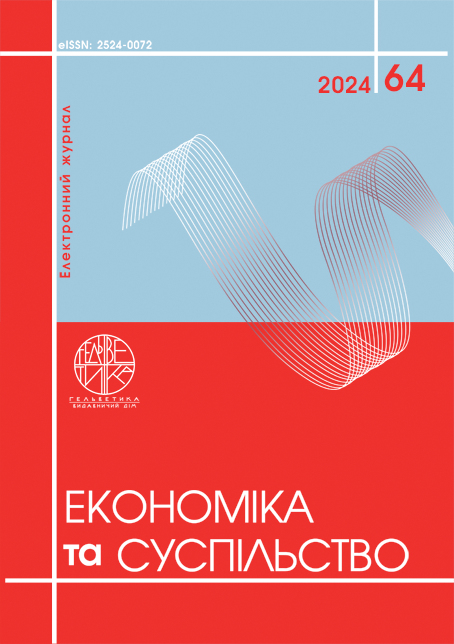ANALYSIS OF SUBJECTIVE FACTORS OF CORPORATE STAFF WELL-BEING
Abstract
The article is devoted to the analysis of subjective (personal) factors of corporate staff well-being. Staff well-being in corporate management is defined by us as a system of corporate strategy measures aimed at fostering the well-being of individuals (physical health, psychological comfort, financial well-being, active social interaction), and through them – members of the team, collective and all employees of the company. Subjective (personal) factors of the corporate staff well-being are considered as individual characteristics and features of employees that influence their perception of the working environment and job satisfaction. They signal how an employee reacts to the conditions and nature of work and interacts with management and colleagues, which generally affects the overall well-being of the company. In the article, the factors of corporate staff well-being are differentiated into subjective (personal) and objective (corporate). Based on an expert survey, subjective factors were identified, the main of which are atti-tude to work, satisfaction with salary, motivation, cognitive abilities, critical thinking, satisfaction with life, communication skills, desire for self-development, values and beliefs. Based on the expert survey, additional factors of the corpo-rate staff well-being were identified, in particular, motivation, empathy, sociabil-ity, adaptability, tolerance, flexibility, adaptability, emotional intelligence, open-ness, stress resistance, creativity, leadership qualities. The classification of sub-jective factors of corporate well-being according to the following categories is proposed: personal qualities, professional skills, motivational factors, social as-pects, psychological factors, value orientations, professional development, or-ganizational aspects, physical and mental health, interpersonal relations. The re-sults of the research can be used to develop more effective personnel develop-ment programs, improve corporate culture, and create a favorable working envi-ronment, which ultimately will contribute to increasing labor productivity and employee loyalty.
References
Вартанова О.В. Well-being у корпоративному управлінні: ключові моделі та вплив на економічну поведінку. Економіка та суспільство. 2022. № 45. URL: https://economyandsociety.in.ua/index.php/journal/article/view/1909
Вартанова О.В., Кузнецов Д.О. Аналіз факторів професійного виго-рання співробітників і здобувачів закладів вищої освіти в контексті управ-ління благополуччям персоналу. Економіка і суспільство. 2024. № 59. URL: https://economyandsociety.in.ua/index.php/journal/article/view/3426
Карамушка Л., Креденцер О., Терещенко К. Суб’єктивне благопо-луччя освітнього персоналу в умовах війни. Організаційна психологія. Еко-номічна психологія. 2023. № 30(4). С. 23–33. DOI: https://doi.org/10.31108/2.2023.4.30.3
Ruggeri, K., Garcia-Garzon, E., Maguire, Á. et al. (2020). Wellbeing is more than happiness and life satisfaction: a multidimensional analysis of 21 countries. Health and Quality of Life Outcomes, no. 18 (1), pp. 192–198.
Ivonne Wollny, Joanna Apps, Clam Henricson. Can Government Meas-ure Family Wellbeing. Research and Policy for the real world. 2010. 88 p. URL: https://www.researchgate.net/publication/265043980_Can_government_measure_family_wellbeing
OECD Guidelines for Measuring Subjective Wellbeing. URL: https://www.oecd.org/wise/oecdguidelines-on-measuring-subjective-Wellbeing9789264191655-en.htm
Бергсма А., Венховен Р. Щастя людей з психічними розладами в су-часному суспільстві. Психологія благополуччя: Теорія, дослідження та прак-тика, 2011.
Барчі Б.В. Фактори ризику психічного здоров’я працівників на ро-бочому місці. Психологічні умови благополуччя персоналу організацій: ма-теріали I Міжнар. Наук.-практ. онлайн-конфер., 15–17 жовт. 2020 р. Львів : Національний університет «Львівська політехніка», 2020. С. 31–33.
Мирончук Н.М. Професійне вигорання викладача вищої школи: чин-ники, ознаки, способи протидії. Теоретичні і методичні засади розвитку і са-мовдосконалення особистості педагога-новатора в контексті модернізації нової української школи: зб. наук.-метод. праць; за ред. О.А. Дубасенюк. Житомир : Вид-во Євенок О.О., 2017. С. 62–67.
Vartanova O.V. (2022). Well-being u korporatyvnomu upravlinni: kliu-chovi mo-deli ta vplyv na ekonomichnu povedinku [Well-being in corporate governance: key models and influence on economic behavior]. Ekonomika ta suspilstvo. № 45. Available at: https://economyandsociety.in.ua/index.php/journal/article/view/1909
Vartanova O.V., Kuznetsov D.O. (2024). Analiz faktoriv profesiinoho vyho-rannia spivrobitnykiv i zdobuvachiv zakladiv vyshchoi osvity v konteksti upravlinnia blahopoluchchiam personal [Analysis of the factors of professional burnout of employees and graduates of higher education institutions in the con-text of personnel welfare management]. Ekonomika i suspilstvo. № 59. Available at: https://economyandsociety.in.ua/index.php/journal/article/view/3426
Karamushka, L., Kredentser, O., & Tereshchenko, K. (2023). Subiek-tyvne blahopoluchchia osvitnoho personalu v umovakh viiny [Subjective well-being of educational personnel in war conditions]. Orhanizatsiina psykholohiia. Ekonomichna psykholohiia, 30(4), 23–33. DOI: https://doi.org/10.31108/2.2023.4.30.3
Ruggeri K., Garcia-Garzon E., Maguire Á. et al. (2020). Wellbeing is more than happiness and life satisfaction: a multidimensional analysis of 21 countries. Health and Quality of Life Outcomes, no. 18 (1), pp. 192–198.
Ivonne Wollny, Joanna Apps, Clam Henricson. Can Government Meas-ure Family Wellbeing. Research and Policy for the real world. 2010. 88 p. Avail-able at: https://www.researchgate.net/publication/265043980_Can_government_measure_family_wellbeing
OECD Guidelines for Measuring Subjective Wellbeing. Available at: https://www.oecd.org/wise/oecdguidelines-on-measuring-subjective-Wellbeing9789264191655-en.htm
Berhsma A., Venkhoven R. (2011). Shchastia liudei z psykhichnymy ro-zladamy v suchas-nomu suspilstvi [Happiness of people with mental disorders in modern society]. Psykholohiia blahopoluchchia: Teoriia, doslidzhennia ta prak-tyka.
Barchi B.V. (2020). Faktory ryzyku psykhichnoho zdorovia pratsivnykiv na robochomu mistsi [Risk factors for the mental health of workers in the workplace]. Psykholohichni umovy blahopoluchchia personalu orhani-zatsii: materialy I Mizhnar. Nauk.-prakt. onlain-konfer., 15–17 zhovt. r. Lviv : Natsionalnyi universytet «Lvivska poli-tekhnika», 2020. S. 31–33.
Myronchuk N.M. (2017). Profesiine vyhorannia vykladacha vyshchoi shkoly: chynny-ky, oznaky, sposoby protydii [Happiness of people with mental disorders in modern society]. Teoretychni i metodychni zasady rozvytku i samo-vdos-konalennia osobystosti pedahoha-novatora v konteksti modernizatsii novoi ukrains-koi shkoly: zb. nauk.-metod. prats; za red. O.A. Dubaseniuk. Zhytomyr: Vyd-vo Yevenok O.O., S. 62–67.

This work is licensed under a Creative Commons Attribution 4.0 International License.


